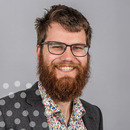Contact
Work group
Economy (Junior Fellow winter term 2023/24)
Benjamin Thomas is a scholar of political ideologies working at the intersections of political theory, political ideas, discourse theory, and ideational, political, and neoliberal histories. Prior to his fellowship at the KFG, he completed a PhD at the University of Nottingham, examining how political ideologies transform by looking domestically, comparatively, and transnationally at the “neoliberalization” of Germany’s Christian Democratic Union (CDU) between 1945 and 1949 and the UK's Conservative Party in the 1970s. His work emphasizes the implications of the social construction of an ideology in an ideological community for its form, the positive justifications made for neoliberalisms with center-right ideologies, and the transnational flows of ideas in the center-right.
Research Project
Encounters with the Transnational Ideological Family: articulating particularism and universalism in the European centre-right
The project examines the period of the cooperation and internationalization of the European center-right in the 1970s and 1980s as a lens for considering how members of ideological communities understand themselves in relation to particularism and universalism. Ideologies make universal claims, asserting that they reflect a true and complete way of understanding the world and politics, but they are self-consciously particular, specific to an ideological community and often a political geography, and cognizant of both the existence of rival ideological communities and similar groups in different jurisdictions. Understanding the self-conception of the ideological community is important for understanding not only the Europeanization of ideologies in the period and how the geographies, spaces, and communities of an ideology could be contested but also the ways they arrived at European and not universal scales. The project will examine the role ordoliberalism and the social market economy played in the ideological expressions of the Christian Democratic and wider center-right in the 1970s and 1980s, paying attention to division and rapprochement.


